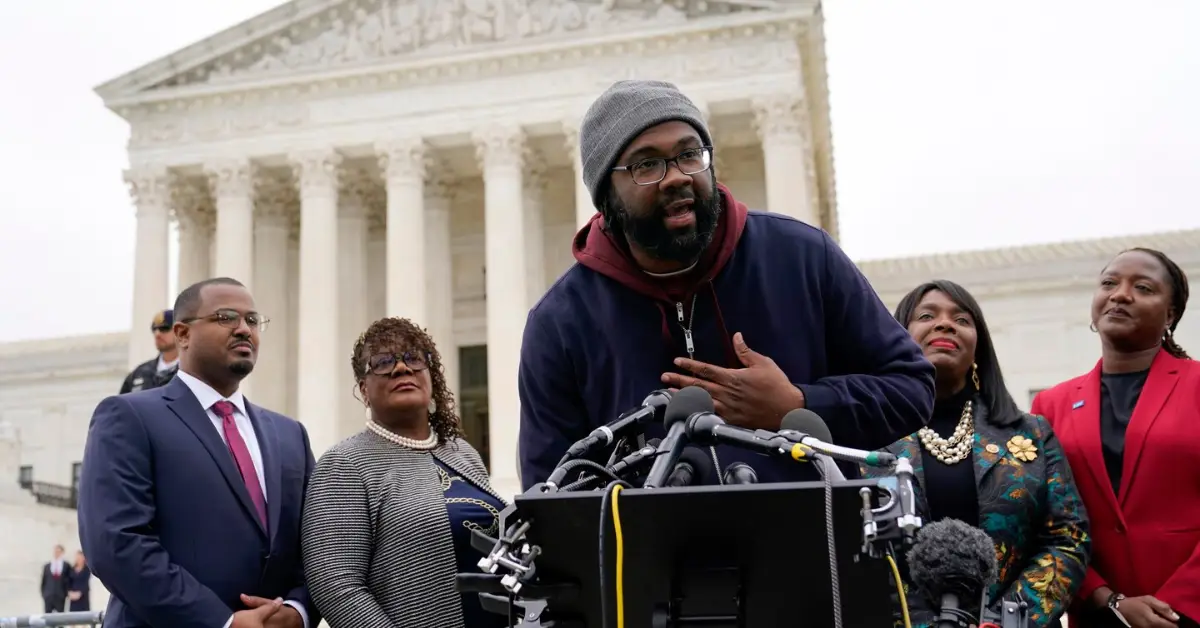The Supreme Court’s surprising endorsement of a portion of the Voting Rights Act was not only a victory for Black voters in Alabama. Still, it may send new Democrats to Congress in as many as four states if the precedent applies to comparable cases nationwide.
The court, split 5-4, overturned Alabama’s congressional design on Thursday, agreeing with a lower court that the state had diluted the power of Black voters by creating only one majority-Black district when there were enough votes for two seats.
Chief Justice John Roberts and fellow conservative Justice Brett Kavanaugh joined the three liberals on the court.
The Republican-controlled Alabama Legislature will be charged with redrawing the state’s seven congressional districts to add two majority-Black – and largely Democratic – seats in the state’s so-called Black Belt. The region is named for the dark, fertile soil farmed by many Black Alabama voters’ enslaved ancestors.
The decision bolstered the Voting Rights Act of 1965, groundbreaking legislation that ensured voting rights for people of color in America, and its impact will be seen far beyond the region.

Many court observers and voting rights advocates were taken aback by Thursday’s decision, partly because the Supreme Court has a 6-3 conservative majority that has frequently ruled against voting rights groups.
In a preliminary judgment in February 2022, the court ordered Alabama to use the disputed map in the midterm elections, indicating that it was likely to favor the state.
A similar case involving Louisiana’s congressional map is expected to require state legislators to establish a second Black congressional district in the state, while courts in Georgia and Texas are considering similar challenges to Section 2 of the law governing federal redistricting maps.
The revisions could impact which party controls Congress: Republicans have a five-seat edge in Congress heading into 2024, and the ongoing debates over congressional maps could be the difference in another close race.
“I think you’re going to see changes to a lot of those maps — if not all of those maps — in short order,” said John Bisognano, president of the National Democratic Redistricting Committee and the National Redistricting Foundation, both of which backed some of the plaintiffs who challenged Alabama’s maps.
POLITICAL STAKES: The Supreme Court’s unexpected affirmation of part of the Voting Rights Act was not just a win for Black voters in Alabama — it could also send new Democrats to Congress there and in other states.https://t.co/1A1EkLsCd1 w/@janestreet
— Lawrence Hurley (@lawrencehurley) June 8, 2023
According to Abha Khanna of the Elias Law Group, who represents plaintiffs in the Alabama lawsuit and other voting rights challenges, “there’s reason to be confident going into these cases” due to the Supreme Court verdict.
“The state defendants’ attempts to see if they can manipulate the law and change it because the facts don’t add up on their side have been fully thwarted,” she added.
Due to Thursday’s judgment, Michael Li, a redistricting specialist at Additional York University School of Law’s Brennan Center for Justice, expects at least three other Black districts to arise in the South.
State and local offices may also change hands. An estimated three dozen congressional challenges are pending across the country.
“That’s not to say that all of those will now succeed — not everything will be as straightforward as Alabama, and it remains to be seen how the court will address more complicated fact patterns,” Li explained.
If you’re interested in reading about the recent news, you can check out the below links:-
- Drew Barrymore Reveals Steven Spielberg’s Role As Her Exclusive Parental Figure
- Astrud Gilberto, Acclaimed Bossa Nova Vocalist, Passes Away at the Age of 83
In addition to the Alabama action, the American Civil Liberties Union has seven other claims involving local, state, or congressional district designs that could be affected by Thursday’s decision.
The Alabama verdict has the most immediate impact on Louisiana and is expected to follow Alabama in redrawing maps.
In June 2022, the Supreme Court allowed Republicans to use a map of Louisiana’s six districts that a judge had struck down because it had only one instead of two sections where Black voters would have had a good chance of electing the representatives of their choice. Republicans won five of the six seats in the November midterm elections under the revised map.
The Supreme Court has put that case on hold until the result of the Alabama case. As a result of Thursday’s decision, the court is now more likely to let the Louisiana order stand, giving Democrats a chance to gain a second seat.
The Georgia case, in which plaintiffs argue that an extra majority-Black district should be created in metropolitan Atlanta, is tentatively scheduled for trial in September, a deadline set by the court to allow it time to examine the Supreme Court’s decision in Allen v. Milligan.
The Texas challenge is further along in the legal procedure than the other states. Bisognano stated that it could establish up to five “coalition districts,” in which several minority groups come together to elect candidates of their choice.
Rep. Suzan DelBene of Washington, the chair of the Democratic Congressional Committee, said following the ruling Thursday that the decision will help “deliver a House of Representatives that better reflects the diversity of our nation.” Still, she did not comment specifically on any potential number of seats.
The National Republican Congressional Committee’s communications director, Jack Pandol, claimed that Democrats were attempting to “rig the game” and “sue till it’s blue” but that “Republicans will grow our majority despite Democrats’ legal end-runs.”
Even if the judgment looks to favor Democrats, it is unclear whether it will result in the formation of enough additional Democratic-leaning majority districts to have a significant impact on future elections, according to Sophia Lin Lakin, an ACLU voting rights lawyer.
“There will be a lot of litigation around every single sentence in this decision,” she said.
Please stay connected with us on nogmagazine.com for more articles and recent news.